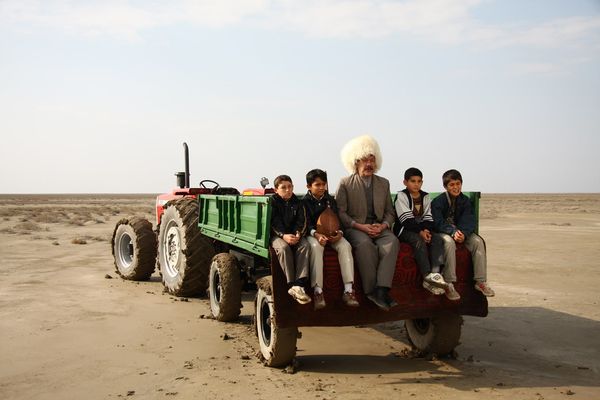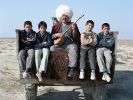Eye For Film >> Movies >> Frontier Blues (2009) Film Review
Frontier Blues
Reviewed by: Andrew Robertson

This as an Iranian film, ostensibly a comedy, but whether it be through translative difficulties or some lack of a shared cultural framework, it rarely raises more than a smile.
Very little happens. There are events, yes, possibly even happenings that are meant to be comic, but in short: Hassan, the idiot, gets a job; his uncle fails to sell clothes; his friend Alam does not get married; the Minstrel has his picture taken.

There may be jokes here relating to the way Tehranis interact with Turkmen, but regional humour rarely translates - who is the same as the Welsh? The Texans? These are not presented as yokels, or at least not in a way that comes across clearly - perhaps they are unsophisticated, but that is in the eye of the beholder. We do not have that framework.
There are moments that amuse - the uncertain photographer ends up posing his subjects, the Minstrel and his quartet of followers, in the same ways. One wordless sequence sees them directed, step by step, to recreate a pose they have already adopted "naturally". Then there's his second driver, a gypsy cab of sorts driven by George Hashemzadeh. Despite the continuous presence of the minstrel's instrument, some never quite clear manner of lute, we hear no song save the cab driver's.
There is Turkmen wrestling, where the competitors hold their positions so the photographer can capture a still moment. There is courtship, too, though the wedding wrestlers are not called for in their intended context. Mahmoud Kalteh is Alam, working in the chicken factory. It is there that Hassan (Abolfazl Karami) gets a job, accompanied by his faithful donkey.
There are some set-pieces that amuse: the clothes shop with no clothes is a long way short of the cheese-shop; a cyclist cycling cyclically raises a chuckle, but most else falls flat - it's not outright farce, too naturalistic to mug, but observational, behavioural comedy requires that we be looking from the same perspective. We don't manage it.
Hassan's uncomprehending gaze, his coke-bottle prophylactic glasses, his diet of dried apricots, his clutched tape-recorder and his habit of phoning numbers at random in order to talk to women clearly intend him to be a comic character. He recalls Napoleon Dynamite, for good or ill, but he lacks the charm, or at least the skills. He fumbles with a shop dummy, loses his donkey. At one point we watch him watching television, a chicken dancing on a hot plate to a bluesy harmonica freakout. It feels almost the same here - uncomprehension, a small amount of cruelty, an absence of context and the something vaguely familiar but not quite placeable.
It's a beautiful film. There are moments where landscape has the chance to speak for itself - the Northern Frontier of Iran, Gulestan Province is an attractive place. Babak Jalili's direction is confident, pretty at times, but what is happening is so slight that we cast about for details. Perhaps the point is that we, as outsiders, are missing the point, that we are seeking story and meaning where there is none - there are, however, more entertaining things to do elsewhere.
Reviewed on: 25 Jun 2010















